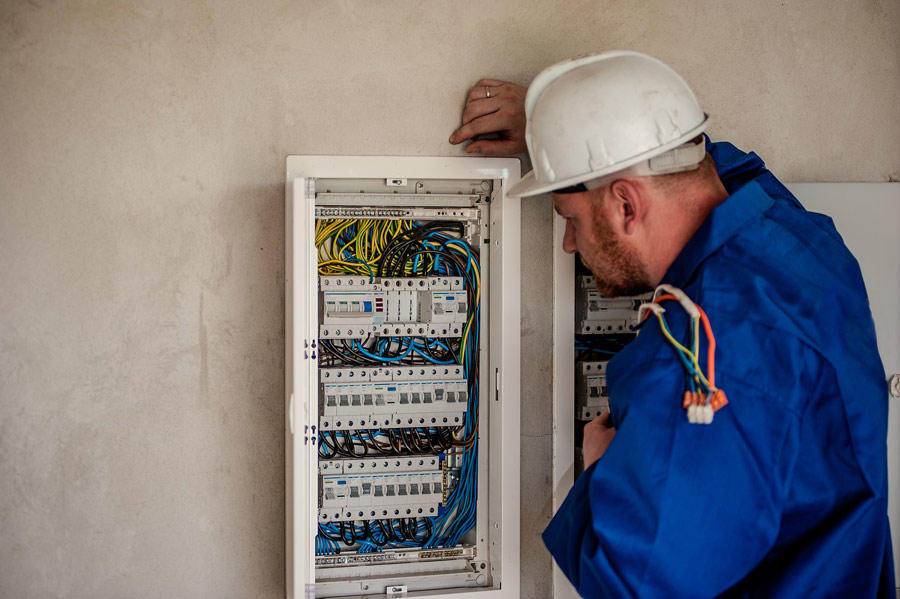
Electricians are tradesmen specialized in electrical wiring of buildings, transmission lines, stationary machines, and related equipment. Electricians could also be employed within the installation of the latest electrical components or the upkeep and repair of existing electrical infrastructure. They can also concentrate on wiring ships, airplanes, and other mobile platforms, also as data and cable lines. Of course, there are many types of electricians who provide various services. The tasks and responsibilities of these electricians are different from each other. So, if you are interested in this field, or if you are willing to become an electrician, you should definitely know about them. Thus, let’s see a list of various types of electricians now.
Various Types of Electricians
- Domestic/Residential Electrician
- Commercial Electrician
- Maintenance Electricians
- Electrotechnical Panel Builder
- Electrical Machine Repairer and Rewinder
- Highway Systems Electrician
- Electrical Instrumentation Technician
- Industrial Electrician
- Low Voltage Electrician
- Automotive Electrician
- Marine Electrician
- Outside Lineman
- A security and fire alarm installer
- Powerhouse and Substation Technician
- Solar Technician
- Wind Turbine Electrician
- Electrical Inspector
- Electrical Contractor
Types of electricians in brief
1. Domestic/Residential Electrician
Of course, this is one of the most “common” job types of electricians. In brief, their responsibility is installing and maintaining everything, including lights, to the complete wiring system of residents. Nevertheless, by gaining experience, they mostly coach a team of electrical workers to plan and draw electrical projects. In brief, below mentioned are some of the primary responsibilities of domestic electricians
- Fixing and diagnosing issues in electrical systems and wiring
- Reading technical blueprints
- Repairing old or broken-down electrical components
- Ensuring the excellent functioning of electrical components in residents
- Installing and maintaining wiring, lighting, and other electrical systems
- Being aware of national electrical safety regulations
2. Commercial Electrician
Commercial electricians mostly work in much larger projects such as office buildings and malls. It needs a huge quantity of electrical power to these buildings than residents. Moreover, for work in this category, electricians need to do a certain number of apprenticeship training. However, below mentioned are some of the significant responsibilities that commercial electricians carry out.
- Reading and understanding technical drawings
- Maintaining and installing electrical wiring into commercial buildings
- Being alert of national electrical safety regulations
- Inspect electrical arrangements to find out whether building owners are in line with safe for work and regulations
- Repairing and diagnosing wiring or electrical issues
- Leading teams of electrical apprentices
3. Maintenance Electricians
Maintenance electricians are also a common group, out of the types of electricians. In brief, the responsibility of them is to guarantee the safe and productive working of critical and large electrical systems in factories and plants. This includes the maintaining of the complete power grid and utility electronics in buildings and also fixing heavy equipment in plants. Apart from that, their job also includes making routine inspections of machinery to check the operating conditions. Hence if there is a problem, they make hands-on substitutes and repairs. Another very important duty is to repair programmable logic functions in agreement with local and national codes.
4. Electro technical Panel Builder
The next type of electrician is electrotechnical panel builders. They manage and construct electronic panels in HVAC systems. Hence, they need more education in the electric field for this type of job. That is because they use programmable logic controls and information technology to wire and connect huge electrical control boxes for industrial machinery. However, they also possess the knowledge to read electrical plans and panel design blueprints.
5. Electrical Machine Repairer and Rewinder
These Electrical Machine Repairer and Rewinder electricians are needed to maintain and repair types of machinery like compressors, fans, pumps, and transformers. They also can pull apart these things and put back together with the electrotechnology components. Another responsibility is winding and connecting coils, and rewinding three-phase and single-phase induction types of machinery for low power.
6. Highway Systems Electrician
Highway systems electricians are specialized in maintaining and installing electronics for highway systems to guarantee a sustainable and safe transportation system. Their duties include roadway lighting, repairing, installing, maintaining traffic lights, revising, and ITS in order to meet with the government standards. These electricians may have to work at heights sometimes up to 70 feet, and they also frequently get exposed to the elements. Hence, this job type is risky and needs to have training in operating motor vehicles and heavy equipment.
7. Electrical Instrumentation Technician
The electrical instrumentation technician’s main task is diagnosing, commissioning, testing, and repairing building control systems. Some of this equipment are heating, refrigeration, and air conditioning. Another duty they are carrying out is calibration and installation of measuring instruments. The extent of these devices allows products to be built to the exact plan.
8. Industrial Electrician
The next type of electrician is an industrial electrician. They work in large manufacturing facilities, power plants, large-scale buildings, and chemical plants. This type of electricians requires more electrical work and power for industries than residential buildings, as the facilities need a lot of heavy machinery and equipment. As their job places are fixed, they often have to move from one job place to another. Otherwise, industries recruit permanent electricians for the job.
9. Low Voltage Electrician
This type of electrician has everyday tasks as residential or commercial electricians. However, there is a difference as they are doing it while working on low voltage systems, which is not higher than 49 volts. Low voltage electricians’ duties include diagnosing issues, home entertainment system installing, closed-circuit television systems, repairing and maintaining internet systems, land-line telephone systems, LAN and WAN networks, fire and security alarms, and fiber optics network.
10. Automotive Electrician
Automotive electricians work with the electrical systems of trucks, cars, and buses. Their work duties are ignition systems, fuel injection systems, car lighting, transmissions, anti-lock brake systems, air conditioning and heating system, and anti-theft systems. You may not need to be a fully-licensed electrician to work with a car electrical system, but it depends on the company you are hired.
11. Marine Electrician
Marine electricians are the people that perform and conduct the trade on boats and ships. A marine electrician’s service is essential for a ship as any electrical may occur when it moves here and there with the tide waves.
Generally, a marine electrician’s duties include renovating the electrical wiring, restoring the electrical combination to power a ship’s engine as well as its navigation systems, and securing work areas aboard vessels to avoid shocks of electricity. A marine electrician has to possess excellent skills in working with few things. They are mentioned below.
- Circuit testers
- Liquid electrical tape
- Wiring connections
- Switches
- Fuses
These electricians are also expected to use ohmmeters and oscilloscopes to ensure that they are functioning correctly. Marine electricians earn a mean yearly salary of $60,340. Wages typically start from $37,070 and go up to $98,217. However, possessing a high school diploma or equivalent is essential for marine electricians. Some electricians start by attending a tech. That is a must for all the people who are willing to be marine electricians. Many technical schools offer programs associated with circuitry, safety practices, and necessary electrical information. Graduates usually receive credit toward their apprenticeship. However, marine electricians can get their training in two different ways. They could obtain their service through the job training or the apprenticeship program. They generally receive their training either through informal, on-the-job training or through an apprenticeship program. Marine electrician training programs are typically offered by schools of seamanship and specialized trade schools.
12. Outside Lineman
Outside Linemen is a person who ensures that the electric power is correctly supplied or provided from power station generation facilities to end-users. They have the responsibility of installing and maintaining all sorts of power transmission and distribution systems for industrial, commercial, and residential markets. In May 2018, Pay-scale reported a salary range of $28,200 to $72,414 for apprentices and $47,100 to $104,482 for journeymen. It also showed these average wages for an electrical lineman counting on experience: 0 to five years: $48,000. 5 to 10 years: $54,000. To become a lineman apprentice, you need to be at least 18 years old and have a Diploma or GED certificate from a high school. Then you can apply to your local Joint Apprenticeship Training Committee (JATC). Some JATCs have additional requirements: a grade of C or better in algebra and a commercial driving license.
13. A security and fire alarm installer
A security and fire alarm installer is a person whose responsibility is installing, maintaining as well as repairing security systems, alarm devices, and other related equipment, following blueprints of electrical layouts and building plans. To start a career as a security alarm installer, you must have a university-level diploma or GED certificate followed by training from a vocational or tech school program. Further, some states require security alarm installers to pass an exam or meet other qualifications to urge a license.
The duty of a solar technician is an essential service for the modern world. When talking about the tasks that are done by solar energy technicians, they’re responsible for planning to install also as for maintaining arrays of solar panels at industrial, commercial, and residential sites around the island. The income of a solar technician varies from an island to another. However, as an example, the solar technicians in the USA generally earn $51152 a year.
14. Powerhouse and Substation Technician
In brief, these powerhouse, substation, and relay electrical and electronics repairers inspect, test, maintain, or repair electrical equipment utilized in generating stations, substations, and in-service relays. These workers are also referred to as powerhouse electricians, relay technicians, or power transformer repairers.
15. Solar Technician
The duty of a solar technician is an essential service for the modern world. When talking about the tasks that are done by solar energy technicians, they’re responsible for planning to install also as for maintaining arrays of solar panels at industrial, commercial, and residential sites around the island.The income of a solar technician varies from an island to another. However, as an example, the solar technicians in the USA generally earn $51152 a year.
16. Wind Turbine Electrician
Wind turbine technicians also referred to as wind techs. In brief, they are the professionals responsible for inspecting and maintaining wind turbines. Meaning that the majority of their days are spent high during a turbine, performing maintenance and troubleshooting the turbine’s electrical, mechanical or hydraulic components and replacing or fixing components that are malfunctioned The average salary of a Wind Turbine Technicians was r$54,370 in 2018. The most paid 25 percent made $69,550 that year, while the lowest-paid 25 percent earned $44,430. Almost whole the training used to happen on the work. Also, a unique technical program teaches students mechanical, electrical, and safety education, among others. They learn everything from the way to use torque wrenches to the way to troubleshoot problems, also as the way to climb and rappel off the side of a turbine in case if they or someone belongs to their team suffers an injury.
17. Electrical Inspector
In brief, an electrical inspector is accountable for testing and checking electrical wiring, circuitry, and equipment in buildings, homes, and industrial installations. Furthermore, they validate the scale and sort of wiring used, the ratings of electrical panels and connectors, and verify that the structure conforms to local and national electrical code requirements. Of course, most electrical inspectors start as regular electricians. Besides, they develop their expertise within the field through years of hands-on experience, working their high from apprentice to journeyman, to master electrician.
However, working as an inspector is typically less physically demanding and puts a premium on the hard-won knowledge electricians have gained from several years within the field. Moreover, labor Statistics bureau lumps in electrical inspectors with all kinds of other building construction inspectors and distributes a nationwide median salary for the group of $57,340 per annum.
On the entire, however, many inspectors can expect to try and do better in comparison. As shown in August 2016 job listings (shown as examples only and don’t denotes a pay rate that is guaranteed], the Electrical Inspector of the city of Durham, North Carolina earns $45,825/year to $71,467/year, and the Electrical Inspector for the town of Gresham, Oregon earns $59,496/year – $75,984/year. Field Investigator for electrical trades in Oklahoma earns $3466.47/month – $3648.92/month extra. As government agencies employ numerous inspectors, benefits and job security both tend to be better than average. Growth of job for electrical inspectors is projected to increase by about eight percent over the following decade, about in line with the average increase for all professions.
18. Electrical Contractor
Specifically, an electrical contractor can be introduced and defined as a business person or company that performs specialized construction work associated with the planning, installation, and maintenance of electrical systems. Furthermore, they’re going to employ external specialists in various sorts of trade as needed, starting from high-voltage power systems to in-house or homework. However, electrical contractors earn a mean income of $52,910 per annum, according to the BLS. Moreover, they’re usually paid by the hour, and their wages are highly contingent upon experience, industry, and geographical region. The center half made between $37,570 and $65,260 per annum. In brief, maintenance duties include inspecting electrical equipment, replacing worn parts, and repairing complex devices. Further, construction duties include bending conduit, lifting heavy objects, stringing wire, and using power tools.
How much money do different types of electricians earn in different states?
As mentioned above in this article, we can see many types of electrician jobs all around the world. Of course, the service of electricians has become an indispensable part of the modern world, and the vacancies for these electricians, which fall under all the above types, go up rapidly. However, all these electricians don’t have the same demand in the market. So the income of each electrician type differs from one to another.
The duty of electricians is one that’s not getting to disappear anytime soon within us. Consistent with the Bureau of Labor Statistics’ Occupational Outlook Handbook, employment of electricians is forecasted to extend faster than average, with approximately 74,100 electrician jobs being added from 2018 to 2028, with a rise of around ten percent.
Specifically, by using and analyzing the occupational data from the Bureau of Labor Statistics, we’ve analyzed and compiled a round-up of the typical electrician salary by the state within the United States of America. Thus, read on for a complete breakdown of where electricians earn the highest amount of money, and where they’re making the smallest amount.
10 States Where Electricians earn the highest salaries.
In brief, the national average annual wage of electricians is $59,190, consistent with the BLS, somewhat above the typical annual salary for all occupations, $51,960. The typical electrician salary can vary significantly counting on the state. However, below may be a list of the top-10 highest-paying states for electricians.
| State | Annual Wage($) |
| New York | $77,810 |
| Alaska | $76,330 |
| Illinois | $75,820 |
| Hawaii | $75,810 |
| New Jersey | $71,660 |
| Minnesota | $70,410 |
| Oregon | $69,330 |
| California | $69,320 |
| Washington | $68,640 |
| Massachusetts | $68,030 |
Moreover, if you wish to learn more about the average salaries of electricians in different states and related info you can simply visit the website of the U.S Bureau of Labor statistics.
There may be several types of electricians, yet they are all electricians after all. Hence, they get together at places like world electrical events and share their experiences while strengthening their bonds. However, despite the type of electrician, the best is to excel in the field while preventing electrical hazards, since safety is important beyond words.




7 comments